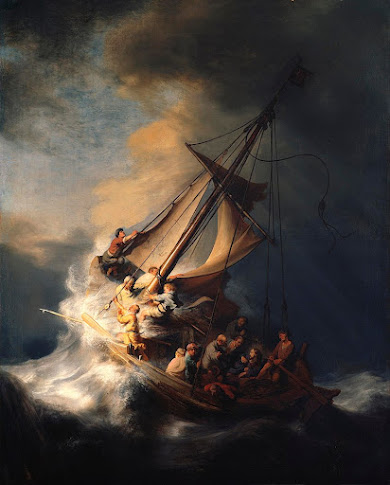"Let us cross to the other side."
Sometimes following Jesus not only does not avoid the storms of life but leads to them. He asks us to cross to the other side of the sea of life, which, much like Galilee, is prone to sudden and unpredictable storms. He calls us out from the apparent safety of the shore because only by traversing the waters will we reach our destination.
A violent squall came up and waves were breaking over the boat,
so that it was already filling up.
We tend to blame the one who gave us the directions to get in the boat in the first place, as though he gave them specifically to antagonize or even to destroy us. When we go to him in our boat and he seems asleep we become even more upset, more convinced of his indifference.
Jesus was in the stern, asleep on a cushion.
They woke him and said to him,
"Teacher, do you not care that we are perishing?"
But if Jesus were really out to get us by sending us headlong into a storm would he really be with us in our boat? He was present with the disciples, sharing their fate, but not their fear. His sleep, which they mistook for indifference, had its source in the deep peace he had within his soul. How else could one rest amidst such chaos? The very thing that made his disciples doubt him ought to have given them comfort. They could have said, 'If he is sleeping, there is nothing to worry about'. But instead they conveyed the lack of trust that has afflicted the human race since Adam "let his trust in his Creator die in his heart" (see CCC 397), and said what we so often echo, "do you not care"? The Lord seemed inactivate, even insensible to the difficulties of steering a ship, or even staying afloat in a fearsome storm. Instead of asking him for help, they accused him. They blamed him for leading them to that point but failed to trust that he could deliver them from it. If it seemed to them necessary to wake Jesus they might simply have done so with a confident faith and asked him, 'Save us, for we are perishing'. After all, what Jesus criticized was not that they cut short his nap, but rather their fear and their lack of faith.
Then he asked them, "Why are you terrified?
Do you not yet have faith?"
It is often fear and lack of faith that motivates our response to the storms of life. This sense of desperation deprives us of our rational agency and especially of our connection to the peace of Christ leading us to take actions which are not only unhelpful but potentially dangerous. Yet Jesus uses even such circumstances as these to reveal himself to us.
They were filled with great awe and said to one another,
"Who then is this whom even wind and sea obey?"
After seeing Jesus reveal his divine authority over the storm we ought to trust him more the next time he decides to sleep in our boat. If we must wake him, let us do so calmly, and with faith. And if he perhaps decides to sleep a little longer than we would prefer, and if we must endure more of the storm, let us learn from the attitude of Therese of Lisieux:
Jesus was sleeping as usual in my little boat; ah! I see very well how rarely souls allow Him to sleep peacefully within them. Jesus is so fatigued with always having to take the initiative and to attend to others that He hastens to take advantage of the repose I offer to Him. He will undoubtedly awaken before my great eternal retreat, but instead of being troubled about it, this only gives me extreme pleasure.- Story of a Soul, Chapter 8 - Therese of Lisieux

No comments:
Post a Comment